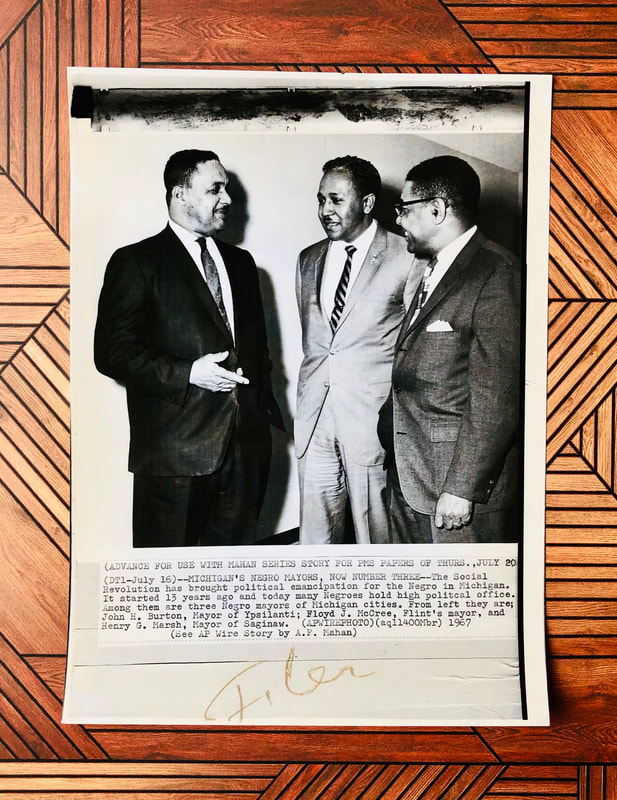CR364
1967 Press Photo - First Negro Michigan Mayors
John H. Burton:
Burton was born in St. Louis, Missouri on July 18, 1910. He graduated with a B.A. from Stowes Teachers College in St. Louis. In 1936, he moved to Ypsilanti. In 1947, he was elected to the Ypsilanti City Council where he served as a council-member in 18 of the 20 years through 1967. In 1967, he was elected by the City Council as Mayor of Ypsilanti succeeding the city's first female mayor, Susan H. Sayre. He was the city's first African-American mayor and one of three Black mayors elected in Michigan in 1967 (along with Henry G. Marsh, mayor of Saginaw; and Floyd J. McCree, mayor of Flint pictures above). He served one term until 1968 when the council elected Timothy J. Dyer as his successor. In 1985, Burton was named to Board of Regents for Eastern Michigan University and elected chairman in 1989. Burton was a member of Omega Psi Phi.
Floyd J. McCree
Floyd Joel Mcree was born in Webster Grove, Missouri, on March 29, 1923. He went to high school in St. Louis and attended Lincoln University, Jefferson City. McCree served in the South Pacific in World War II in the army, rising to the rank of staff sergeant. After leaving the service, he was hired in at the Buick foundry in Flint, becoming a foreman. McCree was later promoted to supervisor of maintenance.
McCree was elected to the Flint City Commission in 1958. The Flint City Commission selected him as mayor for the years 1966–68. During his time as Mayor, he pushed for open housing and employment equal opportunity. In 1967, he was involved in trying to end the violence in Detroit during the 1967 riots. That same year after the City Commission refused to adopt an open housing ordinance, he threatened to resign as mayor. Other prominent African-Americans joined in threatening to resign from public boards. The open housing law was later adopted in a charged contested referendum. McCree continued serving on the City Commission until 1970.
In 1970, he was a Michigan state representatives candidate for the 82nd district. In 1971, McCree took office as Genesee County Register of deeds.
Henry G. Marsh
Marsh was born on October 11, 1921, in Knoxville, Tennessee. He attended Camden Academy and Knoxville College before being drafted into the U.S. Army in 1942. Marsh served in North Africa, Sicily, and Italy, before being honorably discharged in December 1945. He then returned to Knoxville College, where he served as the president of the Alpha Phi Alpha fraternity and graduated in June 1947.
Marsh attended school at Wayne State University Law School and graduated from law school in June 1950. He was admitted to the bar in January 1951, opening an office in Detroit where he practiced until moving to Saginaw. Marsh moved to Saginaw and opened a law office in April 1954. When he arrived, Saginaw was a segregated city where no black man had ever won elected office. Marsh became chairman of the now-extinct Human Rights Commission in 1958. A frequent contributor to The Saginaw News, Marsh ran for and won a seat on the Saginaw City Council in 1961. Though tradition dictated that, as the highest vote-getter, Marsh would receive the title of mayor, he did not, believing that G. Stewart Francke, whom Marsh respected, should serve as mayor considering the difficulties facing the city. Marsh was elected mayor pro tempore in 1965.
Marsh was the city's first African-American mayor. During a time when the 1967 Detroit riot threatened to spill north, Marsh was concerned about the threat of violence from both sides (racially and literally—he ordered that a drawbridge connecting the two sides of the city be raised to stem the flow of traffic from both sides). Marsh formed a committee of over 200 community leaders to discuss concerns facing the city, later calling it his most important accomplishment. He traveled to Washington, D.C., to convince the United States Department of Housing and Urban Development and Vice President Hubert H. Humphrey that the city should be considered a Model City, part of President Lyndon B. Johnson's Great Society. Look Magazine selected Saginaw as an All-American City and an open housing ordinance was passed during Marsh's tenure as mayor. He retired as the city's chief officer in 1969 to return to his law practice. Shortly after Marsh's retirement, the city council successfully petitioned to have the Interstate 675 bridge over the Saginaw River named in Marsh's honor.
Marsh was a co-founder of what was then called First State Bank, which was later acquired by National Bank of Detroit, which in turn through other acquisitions and mergers is now part of J.P. Morgan Chase Bank. He also served as a member of numerous local organizations and commissions. He retired from his law practice in 2000.
Burton was born in St. Louis, Missouri on July 18, 1910. He graduated with a B.A. from Stowes Teachers College in St. Louis. In 1936, he moved to Ypsilanti. In 1947, he was elected to the Ypsilanti City Council where he served as a council-member in 18 of the 20 years through 1967. In 1967, he was elected by the City Council as Mayor of Ypsilanti succeeding the city's first female mayor, Susan H. Sayre. He was the city's first African-American mayor and one of three Black mayors elected in Michigan in 1967 (along with Henry G. Marsh, mayor of Saginaw; and Floyd J. McCree, mayor of Flint pictures above). He served one term until 1968 when the council elected Timothy J. Dyer as his successor. In 1985, Burton was named to Board of Regents for Eastern Michigan University and elected chairman in 1989. Burton was a member of Omega Psi Phi.
Floyd J. McCree
Floyd Joel Mcree was born in Webster Grove, Missouri, on March 29, 1923. He went to high school in St. Louis and attended Lincoln University, Jefferson City. McCree served in the South Pacific in World War II in the army, rising to the rank of staff sergeant. After leaving the service, he was hired in at the Buick foundry in Flint, becoming a foreman. McCree was later promoted to supervisor of maintenance.
McCree was elected to the Flint City Commission in 1958. The Flint City Commission selected him as mayor for the years 1966–68. During his time as Mayor, he pushed for open housing and employment equal opportunity. In 1967, he was involved in trying to end the violence in Detroit during the 1967 riots. That same year after the City Commission refused to adopt an open housing ordinance, he threatened to resign as mayor. Other prominent African-Americans joined in threatening to resign from public boards. The open housing law was later adopted in a charged contested referendum. McCree continued serving on the City Commission until 1970.
In 1970, he was a Michigan state representatives candidate for the 82nd district. In 1971, McCree took office as Genesee County Register of deeds.
Henry G. Marsh
Marsh was born on October 11, 1921, in Knoxville, Tennessee. He attended Camden Academy and Knoxville College before being drafted into the U.S. Army in 1942. Marsh served in North Africa, Sicily, and Italy, before being honorably discharged in December 1945. He then returned to Knoxville College, where he served as the president of the Alpha Phi Alpha fraternity and graduated in June 1947.
Marsh attended school at Wayne State University Law School and graduated from law school in June 1950. He was admitted to the bar in January 1951, opening an office in Detroit where he practiced until moving to Saginaw. Marsh moved to Saginaw and opened a law office in April 1954. When he arrived, Saginaw was a segregated city where no black man had ever won elected office. Marsh became chairman of the now-extinct Human Rights Commission in 1958. A frequent contributor to The Saginaw News, Marsh ran for and won a seat on the Saginaw City Council in 1961. Though tradition dictated that, as the highest vote-getter, Marsh would receive the title of mayor, he did not, believing that G. Stewart Francke, whom Marsh respected, should serve as mayor considering the difficulties facing the city. Marsh was elected mayor pro tempore in 1965.
Marsh was the city's first African-American mayor. During a time when the 1967 Detroit riot threatened to spill north, Marsh was concerned about the threat of violence from both sides (racially and literally—he ordered that a drawbridge connecting the two sides of the city be raised to stem the flow of traffic from both sides). Marsh formed a committee of over 200 community leaders to discuss concerns facing the city, later calling it his most important accomplishment. He traveled to Washington, D.C., to convince the United States Department of Housing and Urban Development and Vice President Hubert H. Humphrey that the city should be considered a Model City, part of President Lyndon B. Johnson's Great Society. Look Magazine selected Saginaw as an All-American City and an open housing ordinance was passed during Marsh's tenure as mayor. He retired as the city's chief officer in 1969 to return to his law practice. Shortly after Marsh's retirement, the city council successfully petitioned to have the Interstate 675 bridge over the Saginaw River named in Marsh's honor.
Marsh was a co-founder of what was then called First State Bank, which was later acquired by National Bank of Detroit, which in turn through other acquisitions and mergers is now part of J.P. Morgan Chase Bank. He also served as a member of numerous local organizations and commissions. He retired from his law practice in 2000.



